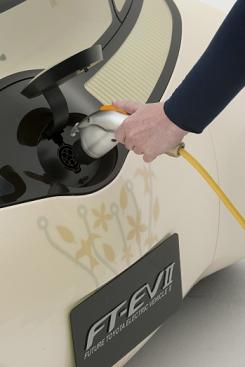U.S. Retailers See Competitive Advantage In Courting EV Owners
 Appealing to a customer base with an eye for sustainability, Best Buy, Cracker Barrel, Fred Meyers, and Walgreens have all issued promises to install EV Chargers in the near future. By "cornering the market," the businesses seek to appeal directly to a growing segment of the shopping public, providing something their competitors may never have considered before.
Appealing to a customer base with an eye for sustainability, Best Buy, Cracker Barrel, Fred Meyers, and Walgreens have all issued promises to install EV Chargers in the near future. By "cornering the market," the businesses seek to appeal directly to a growing segment of the shopping public, providing something their competitors may never have considered before.
Cracker Barrel has partnered with ECOtality and the federally sponsored EV Project, to install EV chargers at their stores in Tennessee (Nashville, Knoxville, and Chattanooga). According to Cracker Barrel’s CEO Michael Woodhouse "Electric vehicle charging is consistent with the company’s roots, and the guests get some value added with the country cooking."
Fred Meyers stores in Oregon and Washington are installing Level 2 Blink EV chargers. The chargers are primarily for shoppers looking to replenish their charge while patronizing their stores.
Best Buy has been quiet about installing electric chargers in their parking lots; it’s not a matter of if they are going to do it, but when. Best Buy owns tech-repair chain Geek Squad and has been contracted by Ford Motor company to install Ford home chargers. The "big-box" electronics chain already sells Brammo electric motorcycles and a host of other electric bikes and scooters. Best Buy has already started to position itself as an EV central hub among retailers.
Walgreens is currently on track to own forty percent market share of all public EV charging stations in the U.S. by the end of 2011. The EV charging stations at eight hundred Walgreen locations will feature either a high-speed direct current charger that can add thirty miles of range in as little as ten minutes of charging time, or a Level 2 charger that can add up to twenty miles of range per hour of charge.
According to Mark Wagner, Walgreens President of Community Management and Operations, "Consumer interest and enthusiasm has been incredible and we’re excited to provide locations to charge up in neighborhoods across the country. As more Americans embrace environmentally sustainable technologies, our convenient locations make us uniquely positioned to help address the concern around accessibility or range confidence."
 Appealing to a customer base with an eye for sustainability, Best Buy, Cracker Barrel, Fred Meyers, and Walgreens have all issued promises to install EV Chargers in the near future. By "cornering the market," the businesses seek to appeal directly to a growing segment of the shopping public, providing something their competitors may never have considered before.
Appealing to a customer base with an eye for sustainability, Best Buy, Cracker Barrel, Fred Meyers, and Walgreens have all issued promises to install EV Chargers in the near future. By "cornering the market," the businesses seek to appeal directly to a growing segment of the shopping public, providing something their competitors may never have considered before.